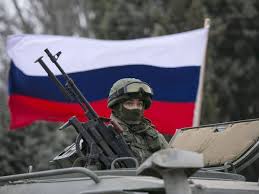What we’re seeing in Ukraine we’ve seen before; namely, Russia’s incursion into Georgia in 2008 when that government attempted to wrest back its secessionist breakaway territories of South Ossetia and Abkhazia. We did nothing then. We will do little now, simply because we lack leverage.
The Crimea itself, now fully occupied by Russian troops, poses a strategic necessity for Russia that goes back 240 years. Adjacent to the Black Sea, it provides Russia with warm water naval outreach to the Eastern Mediterranean and Middle East. Russia is unlikely to hand it back to a belligerent regime.
The scenario could get even worse for Ukraine, since Russian incursion may not stop with seizing the Crimea. After all, a large swath of Eastern Ukraine is also Russian speaking. One incident and Putin is likely to seize upon it as pretext for moving troops into this area as well. Just yesterday, there was a bloody exchange between rival factions in the region. In short, the dismemberment of Ukraine may already be underway.
But the situation could prove even more sinister: Russia may decide to depose the Ukraine’s interim government and install a puppet regime loyal to its interests. It tried to do this in Afghanistan in the 1980s, propping up a Marxist government. What this would mean for Ukrainians is painful to contemplate–perhaps civil war between the factions or an incipient resistance movement.
I find it ironic, to say the least, that Russia has waged two conflicts to keep Chechnya within the Mother Land, yet has abetted secession efforts in Georgia and, currently, Ukraine.
In all of this, our hands are sadly tied, exacerbated by our own confusion. The G8 nations of which Russia is a member, could refuse to attend this June’s trade summit scheduled in Sochi. Acting more bravely–don’t hold your breath–it could expel Russia. This would sting.
But doing so could hurt our own interests as well. We need Russian cooperation on Syria and Iran, say critics. I would argue, however, that this is moot discussion, since it assumes Russian cooperation as a verity. The truth is that Russia continues its efforts to support a ruthless Syrian regime and remains a potential menace to our efforts to curtail Iranian access to nuclear weaponry. It’s quite evident that Russia, deeply jealous of the West and, especially the U. S., suffers from an immense insecurity complex reflected in a historic penchant for destabilizing Western aims.
Meanwhile, the UN can muster the Security Council, but to what end, since Russia will employ its veto yet again.
In all of this, Russia ironically doesn’t need to invoke troops, since its ultimate weapon to keep Ukraine in line is natural gas, which it enjoys in abundance. Ukraine needs that gas desperately and presently owes Russian billions in deferred payment. Putin, additionally, was already supplying the country with natural gas at sharply reduced rates.
As for the EU, it’s a given that it knows the potential seismic effects of a reduced gas supply from Russia to power its own economies, several of which are already floundering.
In all of this, I would draw a parallel with what happened in 1956 in Hungry, when the Soviets invaded to overthrow an insurgent rebel government. 2000 Hungarians and 700 Soviet soldiers died; 13,000 Hungarians were imprisoned; hundreds executed; and 200,000 refugees fled to the West. Then, as now, the invaders blamed the revolt on western instigation and facist-nazi reactionaries.
The more the free-world protested, the more things stayed the same. The Russians vetoed the Security Council’s mandate to withdraw and ignored the General Assembly’s majority vote. Then, as now, the Kremlin called the West’s bluffs. A few months later, both East and West were working trade deals.
And this is the way things will end for the brave people of Ukraine, despite Western protests and threatened sanctions. Human rights didn’t keep the world from swarming to Sochi for the Winter Olympics.
The heavy truth is that politics has always operated in a context of power, not morality. Right now, Russia enjoys the upper hand.
–rj

